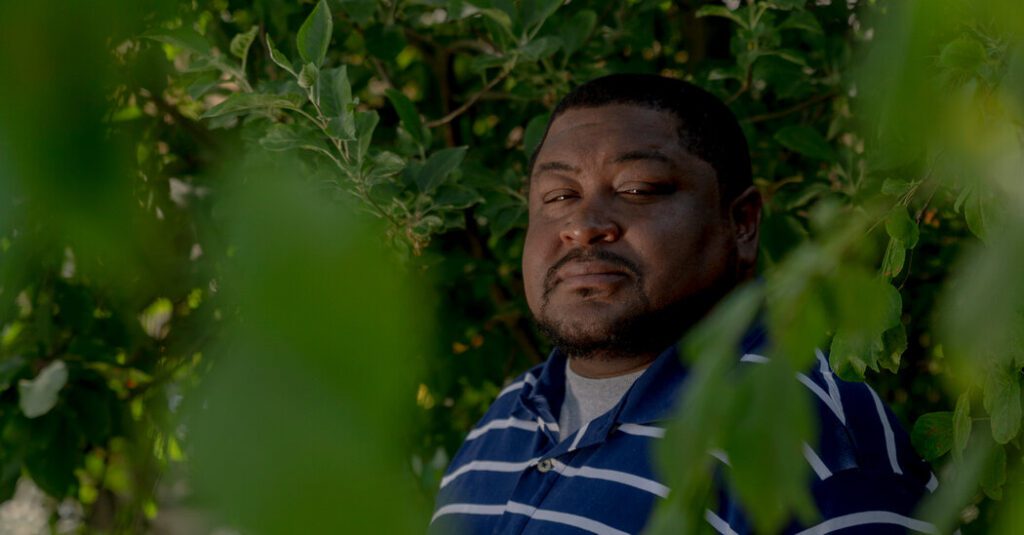In January 2020, Robert Williams spent 30 hours in a Detroit jail as a result of facial recognition expertise instructed he was a felony. The match was fallacious, and Mr. Williams sued.
On Friday, as a part of a authorized settlement over his wrongful arrest, Mr. Williams acquired a dedication from the Detroit Police Division to do higher. The town adopted new guidelines for police use of facial recognition expertise that the American Civil Liberties Union, which represented Mr. Williams, says ought to be the brand new nationwide normal.
“We hope that it strikes the needle in the fitting path,” Mr. Williams mentioned.
Mr. Williams was the primary particular person recognized to be wrongfully arrested based mostly on defective facial recognition. However he wasn’t the final. The Detroit police arrested a minimum of two different individuals because of facial recognition searches gone awry, together with a lady who was charged with carjacking when she was eight months pregnant.
Regulation enforcement businesses throughout the nation use facial recognition expertise to attempt to determine criminals whose misdeeds are caught on digicam. In Michigan, the software program compares an unknown face to these in a database of mug photographs or drivers’ license pictures. In different jurisdictions, the police use instruments, like Clearview AI, that search by pictures scraped from social media websites and the general public web.
One of the vital new guidelines adopted in Detroit is that the pictures of individuals recognized through facial recognition expertise can now not be proven to an eyewitness in a photograph lineup until there’s different proof that hyperlinks them to the crime.
“The pipeline of ‘get an image, slap it in a lineup’ will finish,” mentioned Phil Mayor, a lawyer for the A.C.L.U. of Michigan. “This settlement strikes the Detroit Police Division from being the best-documented misuser of facial recognition expertise right into a nationwide chief in having guardrails in its use.”
The police say facial recognition expertise is a robust software for serving to to resolve crimes, however some cities and states, together with San Francisco; Austin, Texas; and Portland, Ore., have briefly banned its use due to issues about privateness and racial bias. Stephen Lamoreaux, head of informatics with Detroit’s crime intelligence unit, mentioned the Police Division was “very eager to make use of expertise in a significant means for public security.” Detroit, he asserted, has “the strongest coverage within the nation now.”
How It Goes Fallacious
Mr. Williams was arrested after a criminal offense that occurred in 2018. A person stole 5 watches from a boutique in downtown Detroit, whereas being recorded by a surveillance digicam. A loss prevention agency supplied the footage to the Detroit Police Division.
A search of the person’s face towards driver’s license photos and mug photographs produced 243 pictures, ranked so as of the system’s confidence it was the identical particular person on the surveillance video, in response to paperwork disclosed as a part of Mr. Williams’s lawsuit. An previous driver’s license photograph for Mr. Williams was ninth on the checklist. The particular person working the search deemed him the very best match, and despatched a report back to a Detroit police detective.
The detective included Mr. Williams’s image in a “six-pack photograph lineup” — pictures of six individuals in a grid — that he confirmed to the safety contractor who had supplied the shop’s surveillance video. She agreed that Mr. Williams was the closest match to the person within the boutique, and this led to the warrant for his arrest. Mr. Williams, who had been at his desk at an automotive provide firm when the watches had been stolen, spent the evening in jail and had his fingerprints and DNA collected. He was charged with retail fraud and needed to rent a lawyer to defend himself. Prosecutors finally dropped the case.
He sued Detroit in 2021 hoping to drive a ban on the expertise in order that others wouldn’t undergo his destiny. He mentioned he was upset final yr when he discovered that the Detroit police had charged Porcha Woodruff with carjacking and theft after a foul facial recognition match. The police arrested Ms. Woodruff as she was getting her kids prepared for varsity. She has additionally sued the town; the go well with is ongoing.
“It’s so harmful,” Mr. Williams mentioned, referring to facial recognition expertise. “I don’t see the optimistic profit in it.”
The New Guidelines
The Detroit police are liable for three of the seven recognized situations when facial recognition has led to a wrongful arrest. (The others had been in Louisiana, New Jersey, Maryland and Texas.) However Detroit officers mentioned that the brand new controls would forestall extra abuses. They usually stay optimistic concerning the expertise’s crime-solving potential, which they now use solely in circumstances of significant crimes, together with assault, homicide and residential invasions.
James White, Detroit’s police chief, has blamed “human error” for the wrongful arrests. His officers, he mentioned, relied too closely on the leads the expertise produced. It was their judgment that was flawed, not the machine’s.
The brand new coverage, which is efficient as of this month, is meant to assist with that. Below the brand new guidelines, the police can now not present an individual’s face to an eyewitness based mostly solely on a facial recognition match.
“There must be some type of secondary corroborating proof that’s unrelated earlier than there’s sufficient justification to go to the lineup,” mentioned Mr. Lamoreaux of Detroit’s crime intelligence unit. Police would want location info from an individual’s cellphone, say, or DNA proof — one thing greater than a bodily resemblance.
The division can also be altering the way it conducts photograph lineups. It’s adopting what is named a double-blind sequential, which is taken into account a fairer technique to determine somebody. Slightly than presenting a “six-pack” to a witness, an officer — one who doesn’t know who the first suspect is — presents the pictures separately. And the lineup features a completely different photograph of the particular person from the one the facial recognition system surfaced.
The police may even have to disclose {that a} face search occurred, in addition to the standard of the picture of the face being searched — How grainy was the surveillance digicam? How seen is the suspect’s face? — as a result of a poor high quality picture is much less more likely to produce dependable outcomes. They may even need to reveal the age of the photograph surfaced by the automated system, and whether or not there have been different pictures of the particular person within the database that didn’t present up as a match.
Franklin Hayes, Detroit’s deputy chief of police, mentioned he was assured that the brand new practices would forestall future misidentifications.
“There’s nonetheless a couple of issues that may slip up, for instance, similar twins,” Mr. Hayes mentioned. “We will by no means say by no means, however we really feel that that is our greatest coverage but.”
Arun Ross, a pc science professor at Michigan State College who’s an professional on facial recognition expertise, mentioned that Detroit’s coverage was a terrific place to begin and that different businesses ought to undertake it.
“We don’t wish to trample on the rights and privateness of people, however we additionally don’t need crime to be rampant,” Mr. Ross mentioned.
How A lot Does It Assist?
Eyewitness identification is a fraught endeavor, and the police have embraced cameras and facial recognition as extra dependable instruments than imperfect human reminiscence.
Chief White informed native lawmakers final yr that facial recognition expertise had helped “in getting 16 murderers off the road.” When requested for extra info, Police Division officers didn’t present particulars about these circumstances.
As a substitute, to display the division’s successes with the expertise, police officers performed a surveillance video of a person who splashed gas inside a fuel station and set it on hearth. They mentioned he had been recognized with facial recognition expertise and arrested that evening. He later pleaded responsible.
Detroit’s Police Division is likely one of the few that preserve tabs on its facial recognition searches, submitting weekly experiences about its use to an oversight board. In previous years, it has averaged greater than 100 searches a yr, with round half of these searches surfacing potential matches.
The division retains observe solely of how typically it will get a lead, not whether or not the lead pans out. However as a part of its settlement with Mr. Williams — who additionally obtained $300,000, in response to a police spokesperson — it has to conduct an audit of its facial recognition searches courting again to when it first began utilizing the expertise in 2017. If it identifies different circumstances wherein individuals had been arrested with little or no different supporting proof past a face match, the division is meant to alert the related prosecutor.
Molly Kleinman, the director of a expertise analysis middle on the College of Michigan, mentioned the brand new protections sounded promising, however she remained skeptical.
“Detroit is a very surveilled metropolis. There are cameras in all places,” she mentioned. “If all of this surveillance expertise actually did what it claims to, Detroit can be one of many most secure cities within the nation.”
Willie Burton, a member of the Board of Police Commissioners, an oversight group that accepted the brand new insurance policies, described them as “a step in the fitting path,” although he was nonetheless against the usage of facial recognition expertise by the police.
“The expertise is simply not prepared but,” Mr. Burton mentioned. “One false arrest is one too many, and to have three in Detroit ought to sound an alarm to discontinue it.”



